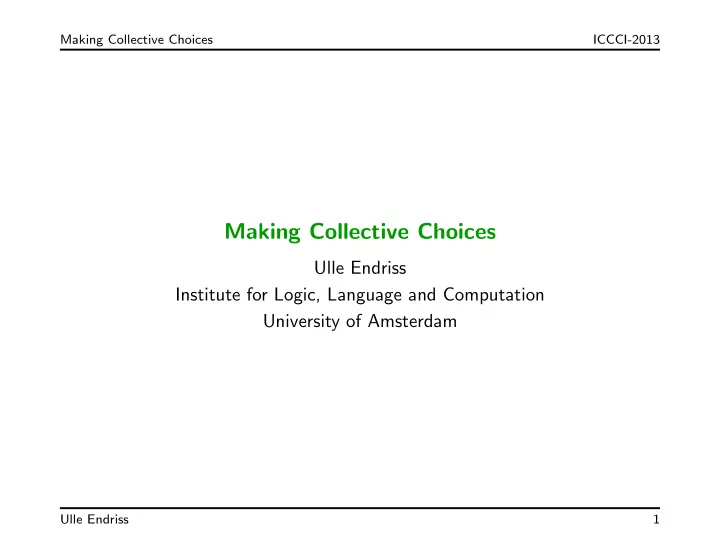

Making Collective Choices ICCCI-2013 Making Collective Choices Ulle Endriss Institute for Logic, Language and Computation University of Amsterdam Ulle Endriss 1
Making Collective Choices ICCCI-2013 Agent 1: ≻ ≻ Agent 2: ≻ ≻ Agent 3: ≻ ≻ Agent 4: ≻ ≻ Agent 5: ≻ ≻ ? Ulle Endriss 2
Making Collective Choices ICCCI-2013 Social Choice and the Condorcet Paradox Social Choice Theory asks: how should we aggregate the preferences of the members of a group to obtain a “social preference”? Agent 1: ≻ ≻ Agent 2: ≻ ≻ Agent 3: ≻ ≻ Agent 4: ≻ ≻ Agent 5: ≻ ≻ Marie Jean Antoine Nicolas de Caritat (1743–1794), bet- ter known as the Marquis de Condorcet : Highly influen- tial Mathematician, Philosopher, Political Scientist, Politi- cal Activist. Observed that the majority rule may produce inconsistent outcomes (“Condorcet Paradox”). Ulle Endriss 3
Making Collective Choices ICCCI-2013 A Classic: Arrow’s Impossibility Theorem In 1951, K.J. Arrow published his famous Impossibility Theorem: Any preference aggregation mechanism for three or more alternatives that satisfies the axioms of unanimity and IIA must be dictatorial . • Unanimity: if everyone says A ≻ B , then so should society. • Independence of Irrelevant Alternatives (IIA): if society says A ≻ B and someone changes their ranking of C , then society should still say A ≻ B . Kenneth J. Arrow (born 1921): American Economist; Pro- fessor Emeritus of Economics at Stanford; Nobel Prize in Economics 1972 (youngest recipient ever). His 1951 PhD thesis started modern Social Choice Theory. Google Scholar lists 12,959 citations of the thesis. Ulle Endriss 4
Making Collective Choices ICCCI-2013 Social Choice and Computer Science Social choice theory has natural applications in computer science: • Search Engines: to determine the most important sites based on links (“votes”) + to aggregate the output of several search engines • Recommender Systems: to recommend a product to a user based on earlier ratings by other users • Multiagent Systems: to aggregate the beliefs + to coordinate the actions of groups of autonomous software agents Vice versa , techniques from computer science are useful for advancing the state of the art in social choice theory . . . F. Brandt, V. Conitzer, and U. Endriss. Computational Social Choice. In G. Weiss (ed.), Multiagent Systems . MIT Press, 2013. Ulle Endriss 5
Making Collective Choices ICCCI-2013 Outline of Rest of Talk • More examples for challenges when making collective choices • Identification of a common pattern • Understanding links between properties of aggregation rules and properties of the space of feasible choices Ulle Endriss 6
Making Collective Choices ICCCI-2013 p p → q q Judge 1: True True True Judge 2: True False False Judge 3: False True False ? Ulle Endriss 7
Making Collective Choices ICCCI-2013 fund museum? fund school? fund metro? Councillor 1: Yes Yes No Councillor 2: Yes No Yes No Yes Yes Councillor 3: ? � � Constraint: we have money for at most two projects Ulle Endriss 8
Making Collective Choices ICCCI-2013 General Perspective We can view many of our problems as problems of binary aggregation: Do you rank option above option ? Yes/No Do you believe formula “ p → q ” is true? Yes/No Do you want the new school to get funded? Yes/No Each problem domain comes with its own integrity constraints: Rankings should be transitive and not have any cycles. The accepted set of formulas should be logically consistent. We should fund at most two projects. The paradoxes we have seen show that the majority rule does not lift our integrity constraints from the individual to the collective level. Ulle Endriss 9
Making Collective Choices ICCCI-2013 Characterisation Results So: Which aggregation rules lift which integrity constraints? Classical perspective (following Arrow): ◮ specify formal axioms for intuitively “good” aggregators Examples: anonymity, neutrality, unanimity, monotonicity, . . . Our perspective: ◮ specify expressive power of language for integrity constraints Example: ¬ ( museum ∧ school ∧ metro ) Example for a result: Theorem 1 An aggregator F will lift all integrity constraints that can be expressed as a conjunction of literals if and only if F is unanimous. U. Grandi and U. Endriss. Lifting Integrity Constraints in Binary Aggregation. Artificial Intelligence , 199–200:45–66, 2013. Ulle Endriss 10
Making Collective Choices ICCCI-2013 Can we avoid all paradoxes? That is: Are the aggregators that lift all integrity constraints? Yes! Theorem 2 An aggregator F will lift all integrity constraints if and only if F is a representative-voter rule (that is, if F is defined by a function g from profiles to agents via F ( B 1 , . . . , B n ) = B g ( B 1 ,...,B n ) ). To be sure, this includes some pretty bad aggregators: • Arrovian dictatorships: g ≡ i (dictator fixed in advance) But also some that look fairly interesting: • return the individual ballot closest to the majority vector • return the individual ballot closest to the average vector U. Grandi and U. Endriss. Lifting Integrity Constraints in Binary Aggregation. Artificial Intelligence , 199–200:45–66, 2013. Ulle Endriss 11
Making Collective Choices ICCCI-2013 Last Slide I have tried to offer a glimpse at computational social choice and presented one particular line of research in this broad field: • many paradoxes of collective choice have a common structure • useful general model: binary aggregation with integrity constraints • necessary and sufficient conditions for paradox-free aggregation COMSOC is a booming field of research with lots of opportunities. To find out more about the field, you could have a look at this website (biannual workshop series, PhD theses, mailing list): http://www.illc.uva.nl/COMSOC/ U. Endriss. Computational Social Choice: Prospects and Challenges. Procedia Computer Science , 7:68–72, 2011. Ulle Endriss 12
Recommend
More recommend